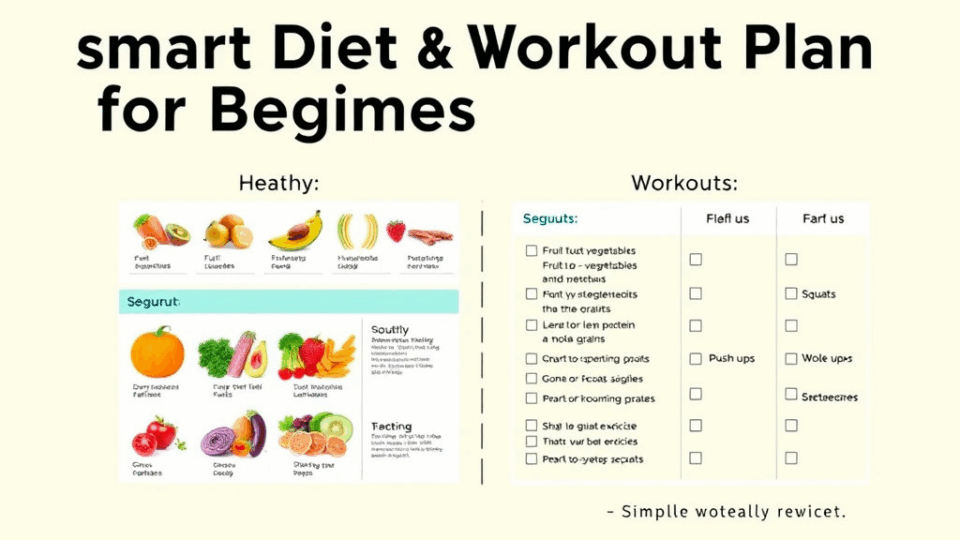
Smart Diet Workout Plan for Beginners
Set SMART Fitness Goals

When starting your fitness journey, it’s easy to feel overwhelmed or unsure of where to begin. That’s why setting SMART goals is such a powerful and helpful strategy. SMART stands for Specific, Measurable, Achievable, Relevant, and Time-bound. These five elements help you create clear and realistic goals that keep you motivated and on track.
Let’s break it down:
– Specific: Instead of saying, “I want to get fit,” try something like, “I want to walk 30 minutes every day.” The more specific your goal, the easier it is to focus.
– Measurable: Track your progress! For example, “I want to lose 5 pounds in 2 months” gives you a clear target.
– Achievable: Set goals that are challenging but possible. If you’re new to exercise, don’t aim to run a marathon in a month. Start with something manageable.
– Relevant: Your goals should align with your personal values and lifestyle. If your goal is meaningful to you, you’re more likely to stick with it.
– Time-bound: Give yourself a deadline. This helps you stay committed and prevents procrastination.
By setting SMART goals, you create a solid foundation for your fitness plan. It’s not about perfection—it’s about progress. Be kind to yourself, celebrate small wins, and remember that every step forward counts. You’ve got this!
Build a Balanced Weekly Workout Routine

Creating a balanced weekly workout routine is one of the most important steps for beginners starting a smart diet and fitness journey. A well-rounded plan helps you stay consistent, avoid burnout, and target all major muscle groups for overall health and progress. The key is to mix different types of workouts—cardio, strength training, flexibility, and rest days—to support your body and mind.
Start by scheduling 3 to 4 workout days per week. For example:
– Monday: Full-body strength training (using bodyweight or light weights)
– Wednesday: Cardio (brisk walking, cycling, or a beginner HIIT session)
– Friday: Strength training (focus on lower or upper body)
– Sunday: Active recovery (gentle yoga or stretching)
Don’t forget to include rest days! They are just as important as workout days because they allow your muscles to recover and grow. If you’re feeling sore or tired, it’s okay to take a break. Listen to your body.
Also, remember to warm up before each session and cool down afterward. This helps prevent injuries and supports flexibility. As you build consistency, you can gradually increase the intensity or duration of your workouts.
By following a balanced routine, you’ll build strength, improve endurance, and stay motivated on your fitness journey. You’ve got this!
Choose Effective Exercises Wisely

When starting a smart diet workout plan, one of the most important steps is choosing the right exercises that align with your fitness level, goals, and lifestyle. As a beginner, it’s easy to feel overwhelmed by the endless options out there—from HIIT to yoga to strength training. But don’t worry, you don’t need to do it all at once. The key is to select exercises that are safe, enjoyable, and sustainable for you.
Start with low-impact workouts like walking, swimming, or beginner yoga to build endurance and confidence. These exercises are gentle on your joints and help establish a consistent routine. As you progress, gradually introduce strength training using bodyweight or light dumbbells to improve muscle tone and boost metabolism.
Also, consider your personal goals. If your aim is weight loss, combining cardio with resistance training can be very effective. If you’re looking to improve flexibility or reduce stress, Pilates or yoga might be a better fit. The most effective workout is the one you can stick with, so choose activities that you genuinely enjoy.
Lastly, listen to your body. Rest when needed, and don’t push yourself too hard too soon. Remember, consistency is more important than intensity in the beginning. By choosing exercises wisely, you’ll set a strong foundation for long-term success and a healthier lifestyle.
Stay Motivated with Small Wins

Starting a new fitness journey can feel overwhelming, especially when you’re just beginning. But here’s a gentle reminder: progress doesn’t have to be big to be meaningful. One of the most effective ways to stay motivated on your smart diet workout plan is by celebrating small wins along the way. These little victories—like choosing a healthy snack, completing a 15-minute walk, or drinking enough water for the day—build momentum and reinforce positive habits.
Small wins help you stay consistent without feeling pressured to be perfect. They give you a sense of accomplishment and keep your motivation alive, especially on days when the bigger goals feel far away. Instead of focusing only on the number on the scale or how many pounds you can lift, try to notice and appreciate the small steps you’re taking every day. These steps are the foundation of long-term success.
So, set mini-goals each week. Maybe it’s cooking a healthy meal three times, stretching every morning, or getting to bed on time. Each time you meet one of these goals, give yourself credit. Write it down, share it with a friend, or treat yourself to something non-food related like a relaxing bath or a new workout playlist. These small rewards reinforce your progress and make the journey enjoyable.
Remember, fitness is not a race. It’s a lifestyle, and every small win is a step closer to a healthier, happier you.

